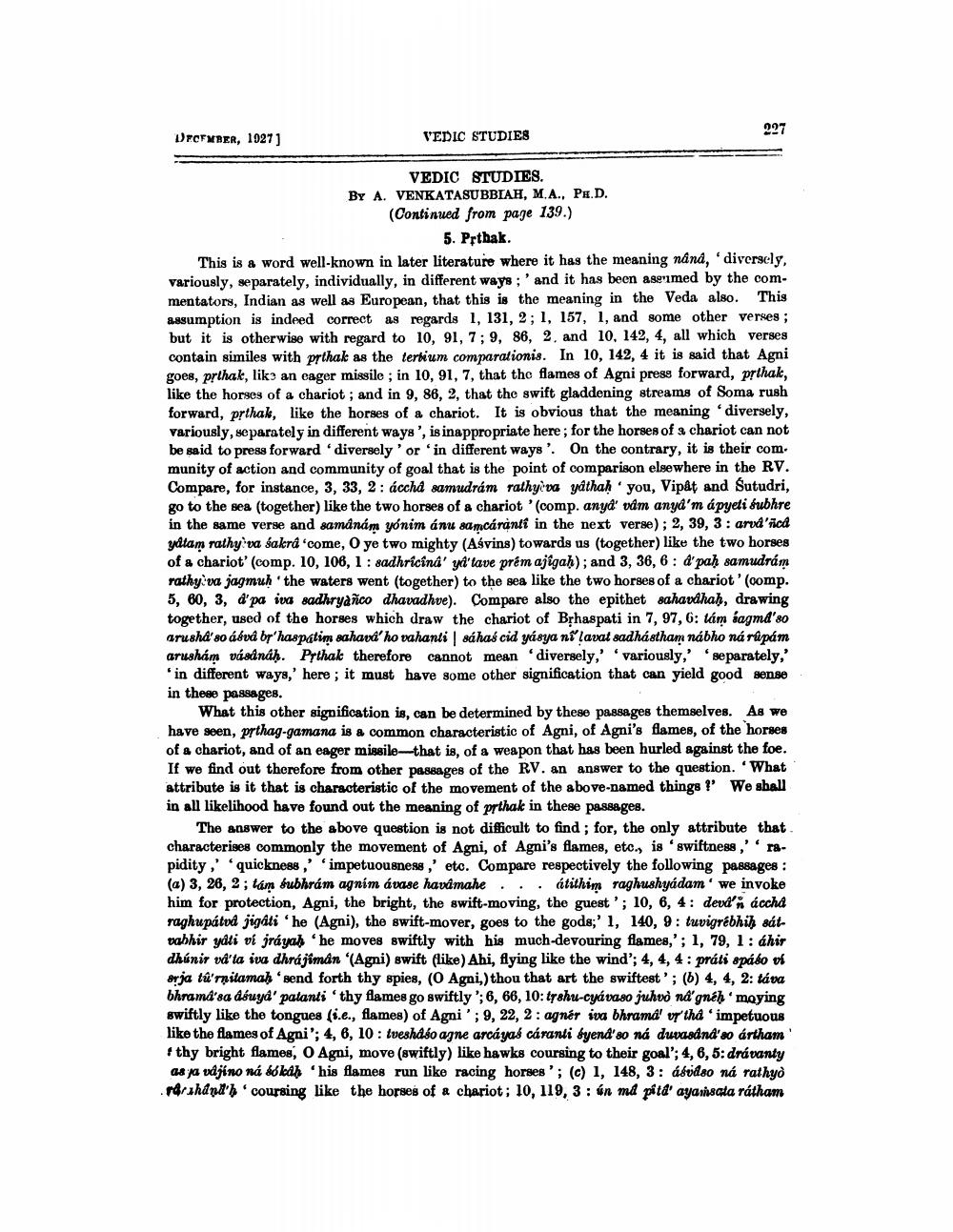________________
VEDIC STUDIES
227
DECEMBER, 10271
VEDIC STUDIES. BY A. VENKATASUBBIAH, M.A., PH.D. (Continued from page 139.)
5. Pfthak. This is a word well-known in later literature where it has the meaning nând, 'diversely, variously, separately, individually, in different ways ; ' and it has been aserimed by the commentators, Indian as well as European, that this is the meaning in the Veda also. This assumption is indeed correct as regards 1, 131, 2; 1, 157, 1, and some other verses ; but it is otherwise with regard to 10, 91, 7, 9, 86, 2, and 10, 142, 4, all which verses contain similes with prthak as the tertium comparationis. In 10, 142, 4 it is said that Agni goes, prihak, like an eager missile; in 10, 91, 7, that the flames of Agni press forward, prthak, like the horses of a chariot ; and in 9, 86, 2, that the swift gladdening streams of Soma rush forward, prthak, like the horses of a chariot. It is obvious that the meaning 'diversely, variously, separately in different ways ', is inappropriate here; for the horses of a chariot can not be said to press forward diversely' or 'in different ways'. On the contrary, it is their com. munity of action and community of goal that is the point of comparison elsewhere in the RV. Compare, for instance, 3, 33, 2: áccha samudrám rathyera ydthah' you, Vipat and Sutudri, go to the sea (together) like the two horses of a chariot '(comp. anya' vdm anya'm ápyeti Subhre in the same verse and samdnám yonim ánu samcáranti in the next verse); 2, 39, 3: arud'nica ydtam rathy va sakrá come, Oye two mighty (Asvins) towards us (together) like the two horses of a chariot' (comp. 10, 106, 1: sadhricina' yd'tave prém ajigah); and 3, 36, 6: d' pah samudrám rathy va jagmuh' the waters went (together) to the sea like the two horses of a chariot 'oomp. 5, 60, 3, d'pa iva sadhryanco dhavadhve). Compare also the epithet sahavdhah, drawing together, used of the horses which draw the chariot of Brhaspati in 7, 97, 6: tám sagmd' 80 arusha'so ásvá bs'haspatim sahavá' ho vahanti sáhas cid yásya ni lavat sadhástham nábho ná růpám arushám vásdnáh. Pythak therefore cannot mean diversely,' 'variously,' separately, 'in different ways,' here ; it must have some other signification that can yield good sense in these passages.
What this other signification is, can be determined by these passages themselves. As we have seen, prthag-gamana is a common characteristic of Agni, of Agni's flames, of the horses of a chariot, and of an eager missile that is, of a weapon that has been hurled against the foe. If we find out therefore from other passages of the RV. an answer to the question. What attribute is it that is characteristic of the movement of the above-named things !' We shall in all likelihood have found out the meaning of prthak in these passages.
The answer to the above question is not difficult to find; for, the only attribute that characterises commonly the movement of Agni, of Agni's flames, etc., is 'swiftness,' rapidity,' 'quickness,' 'impetuousness,' eto. Compare respectively the following passages : (a) 3, 26, 2; tám fubhrám agním ávase havámahe ... átithin raghushyádam' we invoke him for protection, Agni, the bright, the swift-moving, the guest'; 10, 6, 4: devá'n ácchd raghupátvá jigati 'he (Agni), the swift-mover, goes to the gods;' 1, 140, 9: tuvigríbhih sátvabhir ydti vi jráyah he moves swiftly with his much-devouring flames,'; 1, 79, 1: áhir dhúnir vd'ta iva dhrájímán (Agni) swift (like) Ahi, flying like the wind'; 4, 4, 4: práti spáéo di orja tü'rnitamah 'send forth thy spies, (O Agni,) thou that art the swiftest'; (6) 4, 4, 2: tava bhrama'sa asuya' patanti 'thy flames go swiftly'; 6, 66, 10:trshu-cyávaso juhvò ná'gnéh' moying swiftly like the tongues (i.e., flames) of Agni'; 9, 22, 2: agnér iva bhramd' up' tha 'impetuous like the flames of Agni'; 4, 6, 10: tveshdéo agne arcáyas cáranti byend' 80 ná duvasdnd' ao artham
thy bright flames, O Agni, move (swiftly) like hawks coursing to their goal'; 4, 6,5: drávanty as ja vajino na boleh his flames run like racing horses'; (c) 1, 148, 3: ásvdeo ná rathyò rdrahani''coursing like the horses of a chariot; 10, 119, 3: ún md pita' ayansala rátham




